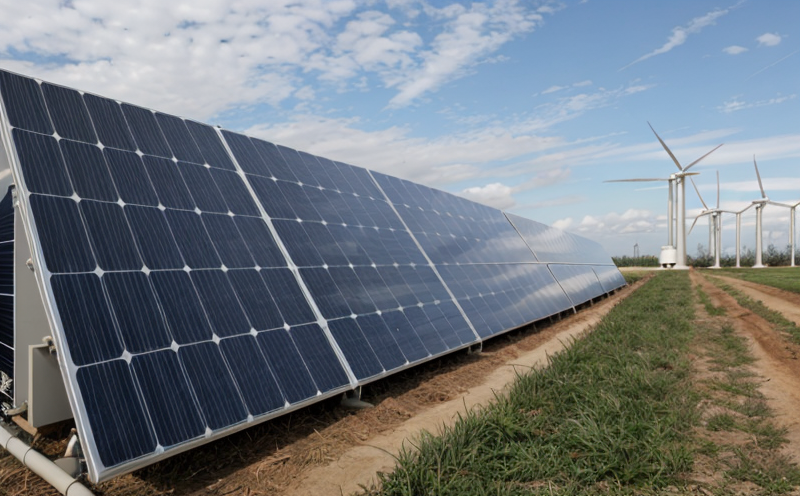
-
Renewable Energy Testing and Standards-
Clean Energy Standard Compliance Testing-
Certification for Clean Energy System Compliance
We provide comprehensive solutions designed to help our clients mitigate risks, enhance performance, and excel in key areas such as quality, health & safety, environmental sustainability, and social responsibility.
Discover
For many years, our organization has been operating successfully, boasting modern laboratories that meet international standards. These laboratories are equipped with the latest technology devices and equipment, and we have built a strong team of experienced and trained personnel to operate them.
DiscoverWelcome to Eurolab, your partner in pioneering solutions that encompass every facet of life. We are committed to delivering comprehensive Assurance, Testing, Inspection, and Certification services, empowering our global clientele with the ultimate confidence in their products and processes.
Discover
-
Renewable Energy Testing and Standards-
Clean Energy Standard Compliance Testing-
Certification for Clean Energy System ComplianceCertification for Clean Energy System Compliance
As the world shifts towards a cleaner and more sustainable energy future, ensuring compliance with clean energy systems has become increasingly important. Governments, regulatory bodies, and industries are implementing strict standards to ensure that renewable energy sources, such as solar and wind power, are harnessed responsibly and efficiently. In this article, we will explore the importance of certification for clean energy system compliance, its benefits, and the process involved.
Why Certification is Essential
Certification for clean energy system compliance is crucial for several reasons:
Certification promotes transparency and accountability among industries, enabling consumers to make informed decisions about their energy choices.
2. How long does the certification process typically take?
The certification process can vary in length depending on the complexity of the system and the level of documentation required.
3. What are some common certification standards for clean energy systems?
Some common certification standards include ISO 50001, IEC 62443-2-4, and others specific to your industry.
4. Can I obtain certification for a custom or bespoke system?
Yes, it is possible to obtain certification for custom or bespoke systems provided they meet relevant industry-specific regulations and standards.
5. Will certification increase the cost of my clean energy system?
While initial costs may be higher due to assessment and verification fees, certification can lead to long-term savings through increased efficiency and reduced environmental impact.
Conclusion
Certification for clean energy system compliance is essential for ensuring that renewable energy sources are harnessed responsibly and efficiently. By understanding the importance of certification, its benefits, and the process involved, industries and consumers alike can make informed decisions about their energy choices and contribute to a more sustainable future.

Healthcare and Medical Devices
The Evolution of Healthcare and Medical Devices: Trends, Innovations, and Challenges The healthcare...

Environmental Simulation Testing
Environmental Simulation Testing: A Comprehensive Guide In todays world, where technology is rapidl...

Electrical and Electromagnetic Testing
Electrical and Electromagnetic Testing: A Comprehensive Guide Introduction Electrical and electrom...

Construction and Engineering Compliance
Construction and Engineering Compliance: Ensuring Safety, Quality, and Regulatory Adherence In the ...

Pharmaceutical Compliance
Pharmaceutical compliance refers to the adherence of pharmaceutical companies and organizations to l...

Railway Industry Compliance
Railway Industry Compliance: Ensuring Safety and Efficiency The railway industry is a critical comp...

Fire Safety and Prevention Standards
Fire Safety and Prevention Standards: Protecting Lives and Property Fire safety and prevention stan...

Industrial Equipment Certification
Industrial equipment certification is a critical process that ensures industrial equipment meets spe...

Aviation and Aerospace Testing
Aviation and Aerospace Testing: Ensuring Safety and Efficiency The aviation and aerospace industr...

Renewable Energy Testing and Standards
Renewable Energy Testing and Standards: Ensuring a Sustainable Future The world is rapidly transiti...

MDR Testing and Compliance
MDR Testing and Compliance: A Comprehensive Guide The Medical Device Regulation (MDR) is a comprehe...

Food Safety and Testing
Food Safety and Testing: Ensuring the Quality of Our Food As consumers, we expect our food to be sa...

Trade and Government Regulations
Trade and government regulations play a vital role in shaping the global economy. These regulations ...

Military Equipment Standards
Military Equipment Standards: Ensuring Effectiveness and Safety The use of military equipment is a ...

Pressure Vessels and Installations Testing
Pressure Vessels and Installations Testing Pressure vessels are a critical component of various ind...

Battery Testing and Safety
Battery Testing and Safety: A Comprehensive Guide As technology continues to advance, battery-power...

Energy and Sustainability Standards
In today’s rapidly evolving world, businesses face increasing pressure to meet global energy a...

Electromechanical Safety Certification
Electromechanical Safety Certification: Ensuring Compliance and Protecting Lives In todays intercon...

Lighting and Optical Device Testing
Lighting and Optical Device Testing: Ensuring Performance and Safety Lighting and optical devices a...

Automotive Compliance and Certification
Automotive Compliance and Certification: Ensuring Safety and Efficiency The automotive industry is ...

IT and Data Center Certification
IT and Data Center Certification: Understanding the Importance and Benefits The field of Informatio...

NEBS and Telecommunication Standards
Network Equipment Building System (NEBS) and Telecommunication Standards The Network Equipment Bu...

Consumer Product Safety
Consumer Product Safety: Protecting Consumers from Harmful Products As a consumer, you have the rig...

Hospitality and Tourism Certification
Hospitality and Tourism Certification: Unlocking Opportunities in the Industry The hospitality and ...

Agricultural Equipment Certification
Agricultural equipment certification is a process that ensures agricultural machinery meets specific...

Product and Retail Standards
Product and Retail Standards: Ensuring Quality and Safety for Consumers In todays competitive marke...

Cosmetic Product Testing
The Complex World of Cosmetic Product Testing The cosmetics industry is a multi-billion-dollar ma...

Chemical Safety and Certification
Chemical safety and certification are critical in ensuring the safe management of products and proce...

Transportation and Logistics Certification
Transportation and Logistics Certification: A Comprehensive Guide The transportation and logistics ...

Environmental Impact Assessment
Environmental Impact Assessment: A Comprehensive Guide Environmental Impact Assessment (EIA) is a c...